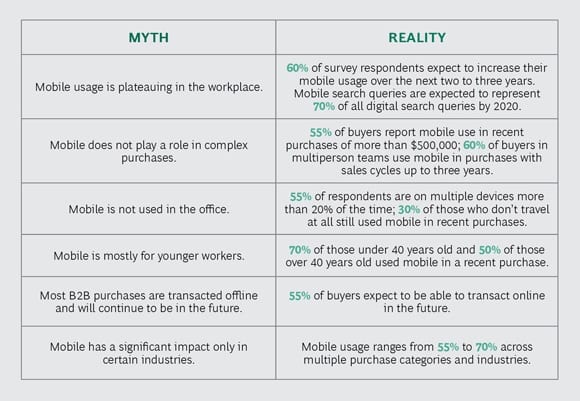Chart of the Day: Statistics exploding the myths that mobile marketing is less important in B2B sectors
We have documented the ongoing growth of mobile adoption in our mobile statistics compilation. Yet most of our stats are based on consumer surveys and panels. It’s rare for B2B specific data to be shown. Given this lack of insight, most businesses will turn to their analytics to assess the importance of visitors from smartphone. Looking at our own analytics, for Smart Insights it seems that mobile visits are relatively unimportant, with smartphones currently accounting for 19% of visitors, with an increase of around 8% increase year-on-year. Yet, one fifth of all visits IS significant especially since as you see with B2C organizations, our conversion rates are lower on smartphones, so lead generation is challenging on mobile.
The Boston Consulting Group research on mobile use in B2B
Given the lack of research on B2B mobile adoption, it was interesting to see this report looking at both business and end-user adoption, although it’s frustrating that the sample for B2B buyers wasn’t given in terms of size or sector.
BCG’s research found that 80% of B2B buyers are using mobile at work, and more than 60% report that mobile played a significant role in a recent purchase. Moreover, some 70% of B2B buyers increased mobile usage significantly over the past two to three years, and 60% expect to continue to increase their mobile usage.
The report also dispels the myths of mobile usage in B2B showing that smartphones are increasingly used ‘across the board’ and do influence sales of large purchases at different seniority levels.

The report also notes that at the same time, B2B online queries are shifting rapidly from the desktop and laptop to the smartphone. Google has found that about 50% of B2B queries today are made on smartphones. BCG expects that figure to grow to 70% by 2020.
The research shows that amongst what they call ‘mobile leaders’ there are some significant shares, nearing 50% of queries, traffic and leads.
I think using the pejorative laggard here is wrong, since the relative percentage of smartphone use will depend on the audience and whether the company has a transactional Ecommerce site. For those B2B businesses that are transactional and have an audience which makes more use of mobile, then it’s inevitable that queries and conversions will be higher.
The report also shows other benefits of mobile though, suggesting a higher lead to purchase velocity and the prospect of improved loyalty if a superior mobile experience is delivered.
Research source